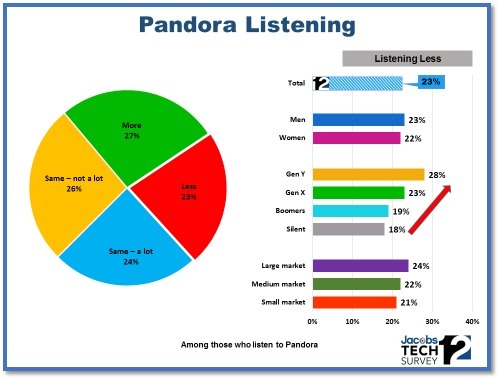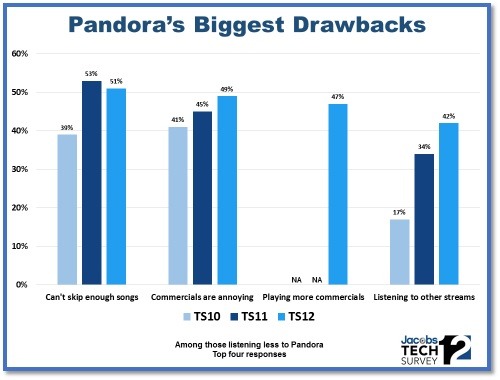
A big announcement earlier this week involved Pandora, the popular audio brand that continues to struggle with its business model. In a surprise move to many, Pandora brought its founder, Tim Westergren, back to run the company as its new CEO, replacing Brian McAndrews.
Wall Street reacted negatively to this announcement, sending Pandora’s shares sharply downward. But I wouldn’t read that much into the stock market’s response to the Westergren comeback. Stock analysts notoriously know very little about how products and brands are truly created and grown, focusing more on the metrics.
They may also be looking at this move in much the same way they’d handicap a radio company’s decision to put a programmer in the corner office. (Of course, that’s what iHeartMedia did with Bob Pittman.) And if that’s their first-blush look at Westergren’s return to the top of the heap at Pandora, they may be grossly underestimating his abilities and his vision.
Pandora clearly has its challenges. They have only flirted with profitability, many are buzzing about the rumors of a possible sale, and there are strong indications that the on-demand nature of competitors like Spotify has begun to usurp its one-time dominance as the streaming music leader. Among consumers, there are signs that Pandora has, in fact, lost its luster.
Here’s a sneak peek at a couple of slides from Techsurvey12, which we’ll present for the first time at the Worldwide Radio Summit in Los Angeles next month. The first shows that a sizable portion – about two in ten Pandora listeners – say they’ve been listening less in the past 12 months.

When we isolate consumers who are spending less time with Pandora, there is a distinct generational trend. The same people who listen most to Pandora – Millennials – are also the ones saying they’re logging in less time with the pure-play. That’s not a good sign.
So what’s the problem? Commercials and other services (yes, Spotify) are conspiring to tamp down Pandora’s story arc. And as you can see, most of these negatives are becoming bigger issues over time.

Thus, Westergren, the spiritual force behind the brand and the guy who first put it on the map. When you think about the core of what Pandora was originally all about – a music channel for music lovers – you can understand why the board brought him back. At heart, Westergren is a musician and an unabashed fan of music. That’s the DNA of Pandora’s original design, the Music Genome Project, and the first stabs at an algorithm designed to predict your next favorite song.
And in the same way that smart radio stations take its program director out on sales calls, Westergren may be able to rekindle some of the fire that Pandora has lost over the past few years as more competitors have entered the fray.
Through acquisitions, Pandora has added both Rdio and Ticketfly (an events ticketing company) to its arsenal. How these assets are integrated into expanding the Pandora music experience and its ability to generate revenue is part of the challenge facing Pandora’s founder.
In Pandora’s press release, Westergren also talked about his vision: “Fundamentally changing the way listeners discover and enjoy music, and the way artists build and sustain their careers. We are pursuing a once-in-a-generation opportunity to create a massive, vibrant music marketplace.”
If that sounds like a new program director standing in the conference room in front of the entire staff, then you have more insight into what Pandora’s board was thinking. Like Jobs, Westergren is a product and design guy, interested first and foremost in creating great fan experiences via a brand that matters in the lives of its consumer base. While data and spreadsheets will play big roles in launching a Pandora comeback, Westergren has the feel for Pandora in ways that are comparable to how a PD envisions his brand.
Nearly seven years ago, I saw Westergren speak in Detroit to a group of Pandora fans. He comes across as personable, real, and truly passionate about his baby. I shot the video below on my iPhone, an interesting glimpse into Westergren’s excitement about Pandora during the very early rounds of funding, long before it went public.
So Pandora is back to having “the same boss” it had when the company first launched: a product guy, first and foremost.
As it turned out for Apple, that may be the smartest strategy of all.
Note: An earlier version of this post incorrectly stated that three in ten Pandora uses have listened less in the past year. It has been corrected.
- What To Do If Your Radio Station Goes Through A Midlife Crisis - April 25, 2025
- A 2020 Lesson?It Could All Be Gone In A Flash - April 24, 2025
- How AI Can Give Radio Personalities More…PERSONALITY - April 23, 2025




“Stock analysts notoriously know very little about how products and brands are truly created and grown, focusing more on the metrics”
Amen.
Many thanks, Clark.
Ditto Clark.
$5bn off the value and PANDORA needs to send a message. New management structure, strong strategy, 81.1m registered subscribers, Jim Feuille Chairman… and knowing the guy who built the boat has his hand on the tiller is positive.
Thanks, Lee. I like the Captain Kirk picture I get from your comment. Nothing like the Starship captain running the show. Thanks for the comment.
While your survey illustrates that Pandora is suffering from some TSL erosion, particularly among Millennials, its still a behemoth with a huge audience. Its problem has never been building audience or even monetizing it – when you look at revenue generated per Listener, Pandora is WAY ahead of radio and doing an excellent job. Pandora’s problem has always been and still is that they pay too much in royalties to ever make a meaningful profit. When you pay over 70% on the dollar and artists habitually complain that they don’t make enough money from it you have what appears to be an unworkable business model.
Here’s the challenge:
Paying even more out might satisfy artists, but would accelerate the furniture burning to stay afloat process that has plagued Pandora from the start. Getting the music industry (that would probably still love to see all digital music options fail) to take a smaller percentage when their revenue is shrinking doesn’t see likely either. Maybe Tim’s background will make the music industry more receptive to a more equitable royalty structure.
It’s kinda sad that people love this so much and there doesn’t seem to be a way to make money at it…and I wish Pandora’s new/old CEO every success. If he can find a way to make it work, radio probably isn’t far behind.
It IS a conundrum when you have a very successful service based on usage and revenue whose business model is damaged by the costs of royalties. As we discussed before in this space, there’s something very contradictory about a situation where the more users and usage you attract, the more your costs become prohibitive. Your “take” on Westergren working more closely with the labels is very likely an avenue that Westergren will pursue. Thanks for reading our blog and commenting.